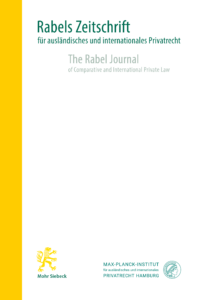RabelsZ 89 (2025): Issue 3
The latest issue of RabelsZ has just been released. It contains the contributions to the symposium in honor of Jürgen Basedow that was held in Hamburg in November 2024. The table of contents is available here. All content is Open Access: CC BY 4.0 and more articles are available Online First.

Eva-Maria Kieninger, Konrad Duden and Ralf Michaels, Preface to the Symposium Issue, pp. 409–410, https://doi.org/10.1628/rabelsZ-2025-0046
Hannah L. Buxbaum, The New Unilateralism in EU Cross-Border Regulation: Objectives, Methods, Institution, oo. 411–431, https://doi.org/10.1628/rabelsZ-2025-0043
For years, Europe was a site of resistance to regulatory unilateralism, particularly as practiced by the United States. Today, though, there are signs of a robust unilateralism at work in EU regulatory practices. To some extent it simply mirrors practices adopted in the United States and elsewhere: Like other lawmakers, the EU has begun to act unilaterally where necessary to achieve effective regulation of its own markets and to protect local interests. In other respects, though, the new unilateralism in the EU presents quite differently. First, the EU increasingly uses its own legislation not to advance purely local regulatory interests, but rather to achieve international or global goals – classically a more multilateral objective. Second, under EU law individual regulations in particular substantive areas are embedded in a larger framework of norms and values that claim universal appeal. In both of these regards, the EU version of unilateralism appears more benign than purely »self-interested« unilateralism. It nevertheless raises important questions about the way that local laws and institutions are used to project regulatory power in the international arena. The goal of this article is to explore these questions. It begins by describing the characteristics of this new unilateralism, in terms of both its doctrinal foundations and its regulatory objectives. It then focuses on one particular mechanism: the adequacy regime established under EU data protection law.
